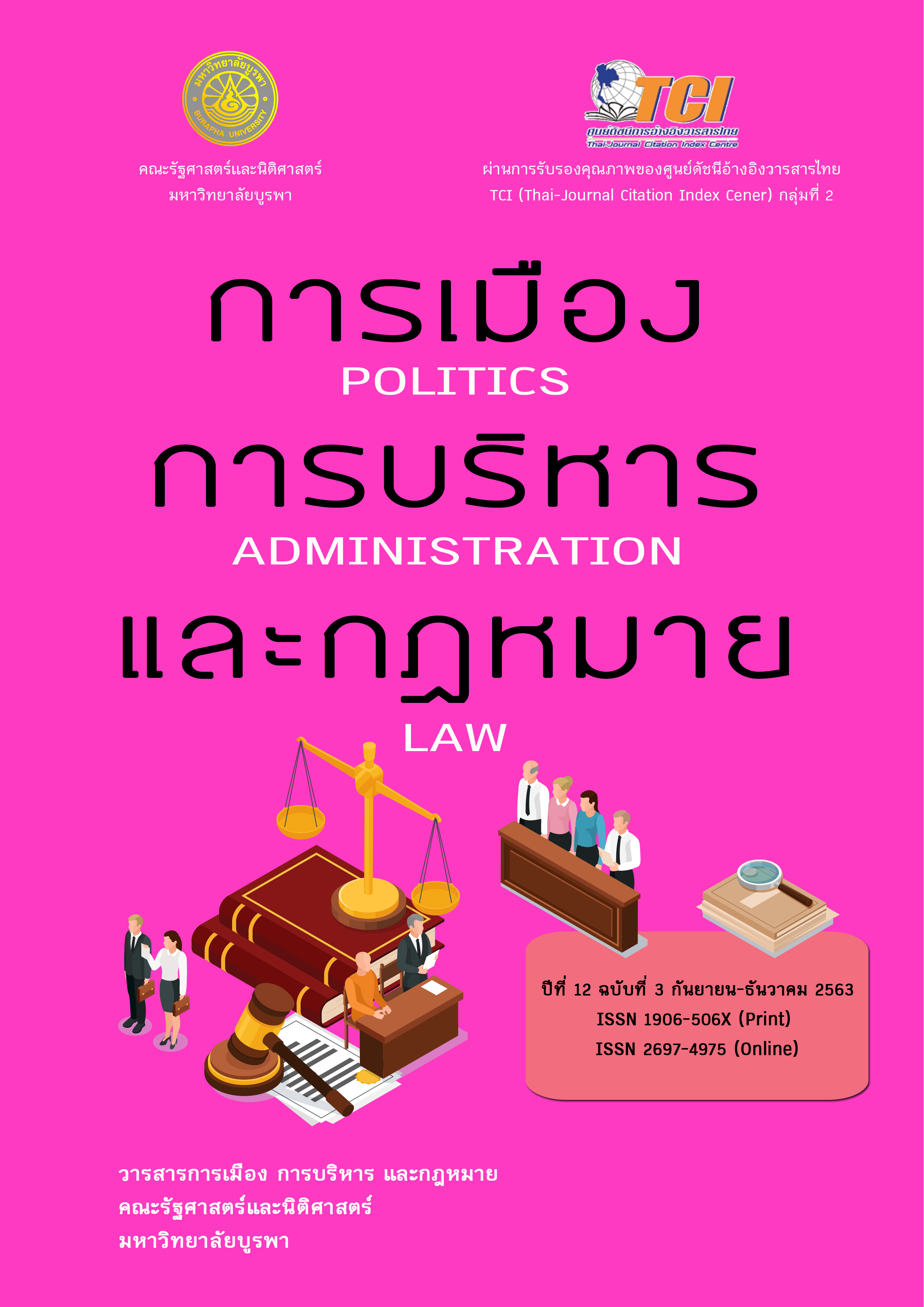ผลการปฏิบัติงานของบุคลากร : กรมทรัพยากรน้ำ กระทรวงทรัพยากรธรรมชาติและสิ่งแวดล้อม
คำสำคัญ:
ผลการปฏิบัติงานของบุคลากร, ทัศนคติต่องาน, แรงจูงใจใฝ่สัมฤทธิ์, พฤติกรรมผู้นำ, การพัฒนาทรัพยากรมนุษย์ และคุณภาพชีวิตในการทำงานบทคัดย่อ
การศึกษาในครั้งนี้มีวัตตุประสงค์ คือ (1) เพื่อศึกษาผลการปฏิบัติงานของบุคลากรของกรมทรัพยากรน้ำ กระทรวงทรัพยากรธรรมชาติและสิ่งแวดล้อม และ (2) เพื่อศึกษาความสัมพันธ์ระหว่าง ทัศนคติต่องาน แรงจูงใจใฝ่สัมฤทธิ์ พฤติกรรมผู้นำ การพัฒนาทรัพยากรมนุษย์ และคุณภาพชีวิตในการทำงาน กับผลการปฏิบัติงานของบุคลากรของกรมทรัพยากรน้ำ โดยใช้แนวทางการวิจัยเชิงปริมาณ ตัวอย่างในการวิจัย คือ บุคลากรของกรมทรัพยากรน้ำ กระทรวงทรัพยากรธรรมชาติและสิ่งแวดล้อม จำนวน 358 คน โดยใช้สถิติเชิงพรรณนา และสถิติอ้างอิง อาทิ สถิติวิเคราะห์องค์ประกอบเชิงสำรวจ สถิติทดสอบ ความเชื่อมั่น สถิติสหสัมพันธ์ของเพียร์สันและสถิติการวิเคราะห์การถดถอยพหุคูณ ผลการวิจัยพบว่า ทัศนคติต่องาน แรงจูงใจใฝ่สัมฤทธิ์ พฤติกรรมของผู้นำ กิจกรรมการพัฒนาทรัพยากรมนุษย์ และคุณภาพชีวิตในการทำงาน มีความสัมพันธ์เชิงบวกกับผลการปฏิบัติงานของบุคลากร ข้อเสนอแนะเชิงทฤษฎีการศึกษาครั้งนี้มีส่วนในการเพิ่มองค์ความรู้ให้กับวิชาการด้านการบริหารทรัพยากรมนุษย์ ประการแรก ผลการวิจัยมีส่วนช่วยทดสอบยืนยันว่า ตัวแปรอิสระที่ได้กล่าวข้างต้น มีความสัมพันธ์เชิงบวกกับผลการปฏิบัติงานของบุคลากร อย่างมีนัยสำคัญทางสถิติ ประการที่สอง ผลการวิจัยได้รูปแบบความสัมพันธ์เชิงเส้นของตัวแปรโดยการสร้างเป็นสมการแสดงความสัมพันธ์เชิงเส้น และข้อเสนอแนะทางปฏิบัติ อาจนำผลการศึกษานี้ไปปรับประยุกต์ใช้ในหน่วยงานโดยใช้เป็นแนวทางในการพัฒนาผลการปฏิบัติงานของบุคลากร ประยุกต์ใช้ในการประเมินหรือสำรวจ เพื่อการพัฒนาผลการปฏิบัติงานของบุคลากร และใช้เป็นแนวทางในการพัฒนาหลักสูตรการฝึกอบรมที่เหมาะสมแก่บุคลากรในหน่วยงาน
เอกสารอ้างอิง
ศิริวรรณ เสรีรัตน์, สมชาย หิรัญกิติ และธนวรรธ ตั้งสินทรัพย์สิริ. (2550). การจัดการ-และพฤติกรรมองค์การ. กรุงเทพฯ: Diamond In Business World.
สร้อยตระกูล (ติวยานนท์) อรรถมานะ. (2550). พฤติกรรมองค์การ: ทฤษฎีและการประยุกต์. กรุงเทพฯ: สำนักพิมพ์มหาวิทยาลัยธรรมศาสตร์.
Adhikari, D. R. (2010). Human resource development (HRD) for performance management: The case of Nepalese organizations. International Journal of Productivity and Performance Management, 59(4), 306-324.
Ahmed, A., & Ramzan, M. (2013). Effect of Job stress on employees of performance: A study on Banking Sector of Pakistan. Journal of Business and Management, 11(6), 61-68.
Armstrong, M., & Baron, A. (2007). Performance management: A strategic and integrated approach to achieve success. Mumbai: Jaico Pushlishing House.
Atkinson, J. W. (1966). Achievement motivation. International Encyclopedia of the Social Sciences, 1, 27-33.
Baba, A. (2015). Effect of Remuneration and Achievement Motivation to be Sar Center Employee Performance Industries Results Plantation Makassar. Journal of Economics and Sustainable Development, 6(5), 217-224.
Bass, B. M. (1985). Leadership and Performance Beyond Expectations. New York: The Free Press.
Biswas, S., & Varma, A. (2011). Antecedents of employee performance: An empirical investigation in India. Employee Relations, 34(2), 177-192.
Blignaut, L. (2011). Personality as predictor of performance for customer service center agents in the banking industry. South Africa: University of South Africa.
Borman, W. C., & Motowidlo, S. J. (1997). Task performance and contextual performance: The meaning for personnel selection research. Human Performance, 10(2), 99-109.
Campbell, J. P. (1983). Some possible implications of “modeling” for the conceptualization of measurement. In F. Landy, S. Zedeck, & J. Cleveland (Eds.), Performance measurement and theory (pp. 277-298). Hillsdale, NJ: Lawrence Eribaum
Associations, Inc.
Campell, J. P. (1990). Modeling the performance prediction problem in industrial and organizational psychology. In Dunnette M. D., & Hough, L. M. (Eds.). Handbook of industrial and organizational psychology (Vol. 1, 2nd ed., pp. 687-732). Palo Alto, CA: Consulting Psychologists Press.
Denhardt, R. B., & Denhardt, J. V., & Aristigueta, M. P. (2009). Managing human behavior in public and nonprofit organizations. Thousand Oaks, CA: Sage.
Foot, M., & Hook, C. (2011). Introducing Human resource management. Harlow, England: Pearson Financial Times/ Prentice Hall.
Gilley, J. W., Eggland, S. A., & Maycunich, A. M. (2002). Principle of Human Resource Development. Cambridge, MA: Perseus.
Gorda, E. S., Lestari, N. P. N. E., & Budhi, M. K. S. (2016). Organizational communication, career pattern, achievement motivation, organizational commitment and employee performance. International Journal of Economics, Commerce and
Management, 4(4), 517-530.
Hoque, M. E., & Ali, M. H. (1998). Achievement motivation and performance of public sector commercial bank employees in Bangladesh. IJIR, 33(4), 497-505.
Hosmani, A. P., & Shambhushankar, B. R. (2014). Study on impact of quality of work life on job performance amongst employee of Secunderabad Division of South Center Railway. Research Journal of management Sciences, 3(11), 8-11.
Jankingthong, K., & Rurkkhum, S. (2012). Factors Affecting Job Performance: A Review of Literature. Silpakorn University Journal of Social Sciences, Humanities, and Arts. 12(2), 115-127.
Lee, C. C., & Chen, C. J. (2013). The relationship between employee commitment and job attitude and its effect on service quality in the tourism industry. American Journal of Industrial and Business Management, 3, 196-208.
McClelland, D. C. (1961). The Achievement Society. New York: D. Van Nostrand.
McClelland, D. C., Atkinson, J. W., Clark, R. A., & Lowell, E. A. (1953). The achievement motive. New York: Appleton Crofts.
Murray, H. A. (1938). Explorations in Personality. New York: Oxford University Press.
Schleicher, D. J., Watt, J. D., & Greguras, G. J. (2004). Reexamining the Job Satisfaction-Performance Relationship: The Complexity of Attitudes. Journal of Applied Psychology, 89(1), 165-177.
Shanmugam, B., & Gannapathi R. (2017). A study on quality of work life and job performance of construction worker in Chennai. International Journal of Scientific Research and Modern Education, 2(1), 68-71.
Valentine, S., Varca, P., Godkin, L., & Barnett, T. (2010). Positive Job response and ethical job performance. Journal of Business Ethics, 91(2), 195-206.
Yamane, T. (1973). Statistics: An introductory analysis. New York: Harper & Row.






